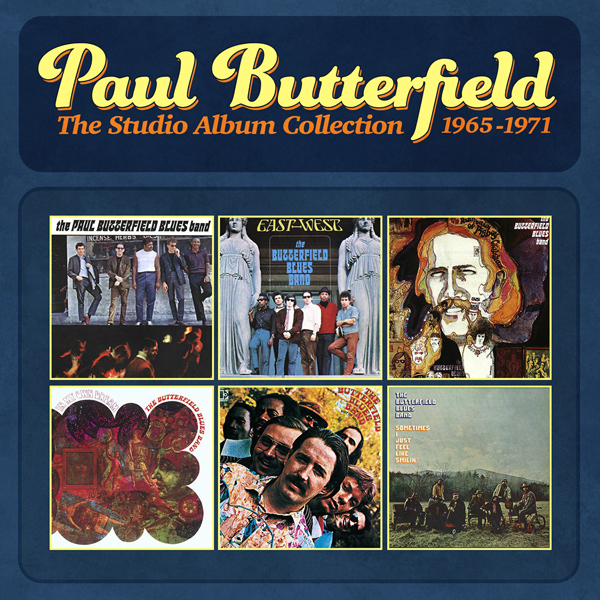
The Paul Butterfield Blues Band – The Studio Album Collection 1965-1971 (2015)
6 Albums | FLAC (tracks) 24 bit/192 kHz | Time – 246:27 minutes | 9,47 GB | Genre: R&B
Studio Master, Official Digital Download | Source: HDTracks | @ Rhino/Elektra
Paul Butterfield was the first white harmonica player to develop a style original and powerful enough to place him in the pantheon of true blues greats. It’s impossible to overestimate the importance of the doors Butterfield opened: before he came to prominence, white American musicians treated the blues with cautious respect, afraid of coming off as inauthentic. This collection includes the studio tracks recorded between 1965 and 1971.
Not only did Butterfield clear the way for white musicians to build upon blues tradition (instead of merely replicating it), but his storming sound was a major catalyst in bringing electric Chicago blues to white audiences who’d previously considered acoustic Delta blues the only really genuine article. His initial recordings from the mid-’60s — featuring the legendary, racially integrated first edition of the Paul Butterfield Blues Band — were eclectic, groundbreaking offerings that fused electric blues with rock & roll, psychedelia, jazz, and even (on the classic East-West) Indian classical music. As members of that band — which included Michael Bloomfield and Elvin Bishop — drifted away, the overall impact of Butterfield’s music lessened, even if his amplified harp playing was still beyond reproach. He had largely faded from the scene by the mid-’70s, and fell prey to health problems and drug addiction that sadly claimed his life prematurely. Even so, the enormity of Butterfield’s initial impact ensured that his legacy was already secure.
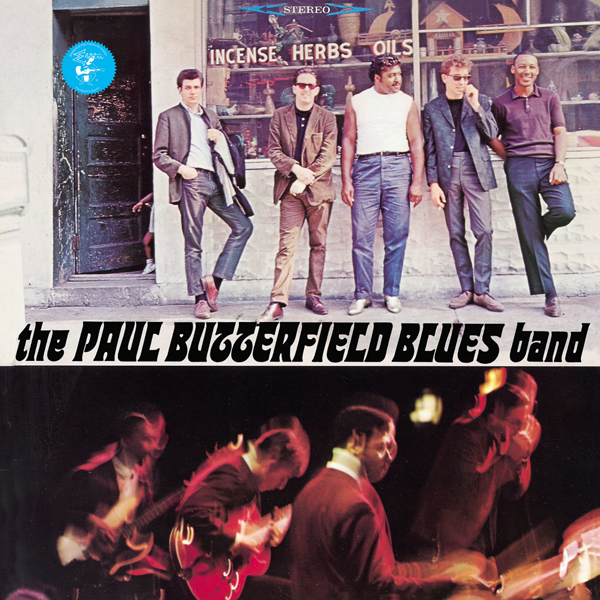
The Paul Butterfield Blues Band – The Paul Butterfield Blues Band (1965/2015)
FLAC (tracks) 24-bit/192 kHz | Time – 38:09 minutes | 1,38 GB
Studio Master, Official Digital Download | Artwork: Front cover
Even after his death, Paul Butterfield’s music didn’t receive the accolades that were so deserved. Outputting styles adopted from Howlin’ Wolf and Muddy Waters among other blues greats, Butterfield became one of the first white singers to rekindle blues music through the course of the mid-’60s. His debut album, The Paul Butterfield Blues Band, saw him teaming up with guitarists Elvin Bishop and Mike Bloomfield, with Jerome Arnold on bass, Sam Lay on drums, and Mark Naftalin playing organ. The result was a wonderfully messy and boisterous display of American-styled blues, with intensity and pure passion derived from every bent note. In front of all these instruments is Butterfield’s harmonica, beautifully dictating a mood and a genuine feel that is no longer existent, even in today’s blues music. Each song captures the essence of Chicago blues in a different way, from the back-alley feel of “Born in Chicago” to the melting ease of Willie Dixon’s “Mellow Down Easy” to the authentic devotion that emanates from Bishop and Butterfield’s “Our Love Is Drifting.” “Shake Your Money Maker,” “Blues With a Feeling,” and “I Got My Mojo Working” (with Lay on vocals) are all equally moving pieces performed with a raw adoration for blues music. Best of all, the music that pours from this album is unfiltered…blared, clamored, and let loose, like blues music is supposed to be released. A year later, 1966’s East West carried on with the same type of brash blues sound partnered with a jazzier feel, giving greater to attention to Bishop’s and Bloomfield’s instrumental talents.
Tracklist:
01 – Born In Chicago
02 – Shake Your Money-Maker
03 – Blues With A Feeling
04 – Thank You Mr. Poobah
05 – I Got My Mojo Working
06 – Mellow Down Easy
07 – Screamin’
08 – Our Love Is Drifting
09 – Mystery Train
10 – Last Night
11 – Look Over Yonders Wall
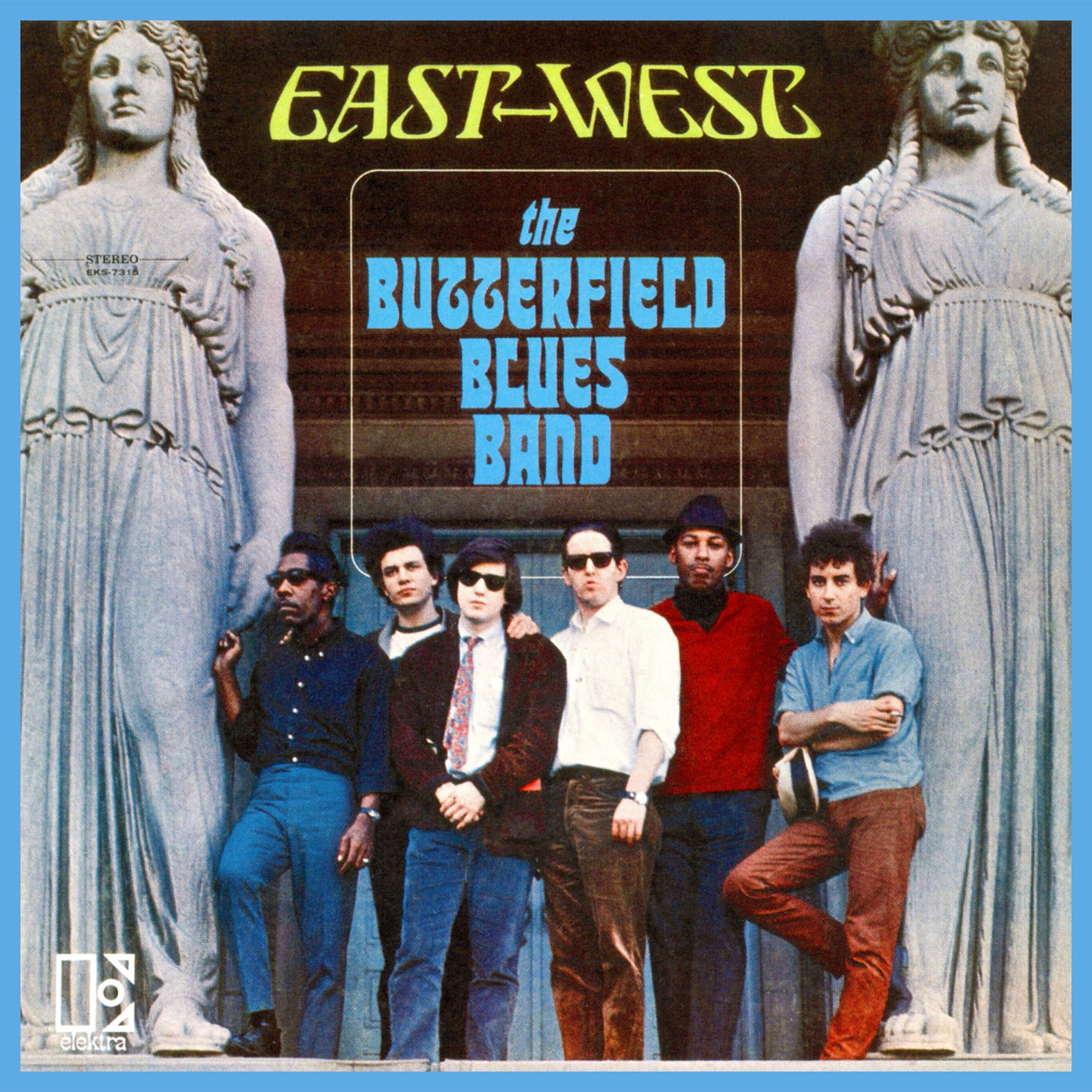
The Paul Butterfield Blues Band – East-West (1966/2015)
FLAC (tracks) 24 bit/192 kHz | Time – 44:58 minutes | 1,79 GB
Studio Master, Official Digital Download | Artwork: Front cover
The raw immediacy and tight instrumental attack of the Paul Butterfield Blues Band’s self-titled debut album were startling and impressive in 1965, but the following year, the group significantly upped the ante with its second LP, East-West. The debut showed that Butterfield and his bandmates could cut tough, authentic blues (not a given for an integrated band during the era in which fans were still debating if a white boy could play the blues) with the energy of rock & roll, but East-West was a far more ambitious set, with the band showing an effective command of jazz, Indian raga, and garagey proto-psychedelia as well as razor-sharp electric blues. Butterfield was the frontman, and his harp work was fierce and potent, but the core of the band was the dueling guitar work of Mike Bloomfield and Elvin Bishop, especially Bloomfield’s ferocious, acrobatic solos, while Mark Naftalin’s keyboards added welcome washes of melodic color, and the rhythm section of bassist Jerome Arnold and drummer Billy Davenport were capable of both the rock-solid support of veteran blues players and the more flexible and artful pulse of a jazz combo, rising and relaxing with the dynamics of a performance. The Butterfield Blues Band sounded muscular and exciting on classic blues workouts like “Walkin’ Blues,” “Two Trains Running,” and “I Got a Mind to Give Up Living,” but the highlights came when the band pushed into new territory, such as the taut New Orleans proto-funk of “Get Out of My Life, Woman,” the buzzy and mildly trippy “Mary, Mary,” and especially two lengthy instrumental workouts, the free-flowing jazz of Nat Adderley’s “Work Song” and the title track, a fiery mix of blues, psychedelia, Indian musical patterns, and several other stops in between, with Butterfield, Bloomfield, and Bishop blowing for all their worth. East-West would prove to be a pivotal album in the new blues-rock movement, and it was the Paul Butterfield Blues Band’s greatest achievement; Bloomfield would be gone by the time they cut their next LP to form the Electric Flag, and as good as Bishop was, losing the thrust and parry between the two guitarists was a major blow. But East-West captures a great group in high flight as the bandmembers join together in something even more remarkable than their estimable skills as individuals would suggest, and its importance as a nexus point between rock, blues, jazz, and world music cannot be overestimated.
Tracklist:
01 – Walkin’ Blues
02 – Get Out Of My Life, Woman
03 – I Got A Mind To Give Up Living
04 – All These Blues
05 – Work Song
06 – Mary, Mary
07 – Two Trains Running
08 – Never Say No
09 – East-West
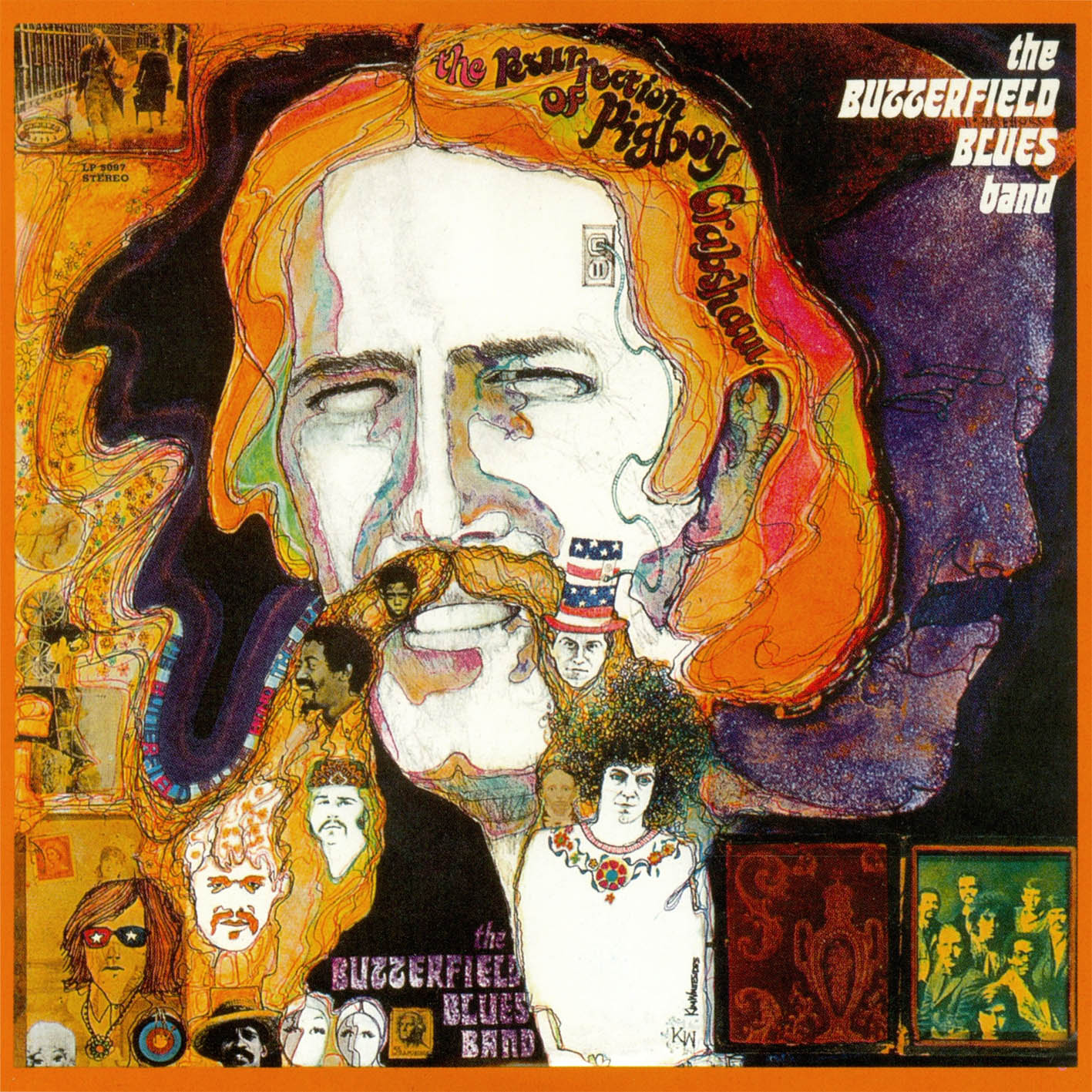
The Paul Butterfield Blues Band – The Resurrection Of Pigboy Crabshaw (1967/2015)
FLAC (tracks) 24 bit/192 kHz | Time – 45:44 minutes | 1,82 GB
Studio Master, Official Digital Download | Artwork: Front cover
The Resurrection of Pigboy Crabshaw is the Paul Butterfield Blues Band’s 1967 studio album. This album is a real conundrum for blues fans in general and fans of the Paul Butterfield Blues Band in particular. The record shifted gears for the band after lead guitarist Mike Bloomfield left, they incorporated a horn section and the overall sound leaned more towards R&B than their previous two albums.
Tracklist:
01 – One More Headache
02 – Driftin’ And Driftin’
03 – Pity The Fool
04 – Born Under A Bad Sign
05 – Run Out Of Time
06 – Double Trouble
07 – Drivin’ Wheel
08 – Droppin’ Out
09 – Tollin’ Bells
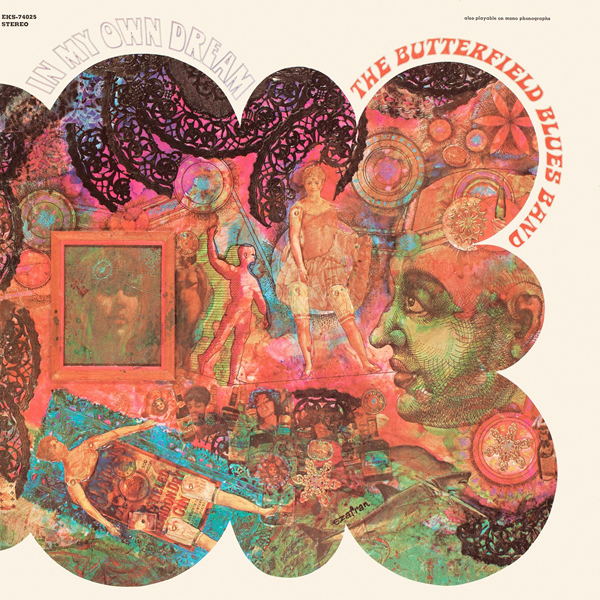
The Paul Butterfield Blues Band – In My Own Dream (1968/2015)
FLAC (tracks) 24-bit/192 kHz | Time – 36:28 minutes | 1,55 GB
Studio Master, Official Digital Download | Artwork: Front cover
Sometimes, one has to wonder whether the youth of the 1960s were really as open to new ideas and new sounds as their press would make you believe. Take the album at hand, In My Own Dream by the Paul Butterfield Blues Band — their fourth official release (though two others have since gone into their discography at earlier points), it marked the point where the band really began to lose its audience, and all for reasons having nothing to do with the quality of their music. They’d gotten past the loss of Michael Bloomfield in early 1967, over which they’d surrendered some of their audience of guitar idolaters, with the engagingly titled (and guitar-focused) Resurrection of Pigboy Crabshaw. In My Own Dream had its great guitar moments, especially on “Just to Be With You,” but throughout the album, Elvin Bishop’s electric guitar shared the spotlight with the horn section of Gene Dinwiddle, David Sanborn, and Keith Johnson, who had signed on with the prior album and who were more out in front than ever. More to the point, this album represented a new version of the band being born, with shared lead vocals, with the leader himself only taking three of the seven songs, and bassist Bugsy Maugh singing lead on two songs, Bishop on one, and drummer Phillip Wilson taking one song. What’s more, there was a widely shared spotlight for the players, and more of a jazz influence on this record than had ever been heard before from the group. This was a band that could jam quietly for five minutes on “Drunk Again,” building ever-so-slowly to a bluesy crescendo where Bishop’s guitar and Mark Naftalin’s organ surged; and follow it with the title track, a totally surprising acoustic guitar-driven piece featuring Sanborn, Dinwiddle, and Johnson. The playing was impressive, especially for a record aimed at a collegiate audience, but the record had the bad fortune to appear at a point when jazz was culturally suspect among the young, an elitist and not easily accessible brand of music that seemed almost as remote as classical music (i.e. “old people’s” music). “Get Yourself Together” was almost too good a piece of Chicago-style blues, a faux Chess Records-style track that might even have been too “black” for the remnants of Butterfield’s old audience.
Tracklist:
01 – Last Hope’s Gone
02 – Mine To Love
03 – Get Yourself Together
04 – Just To Be With You
05 – Mornin’ Blues
06 – Drunk Again
07 – In My Own Dream
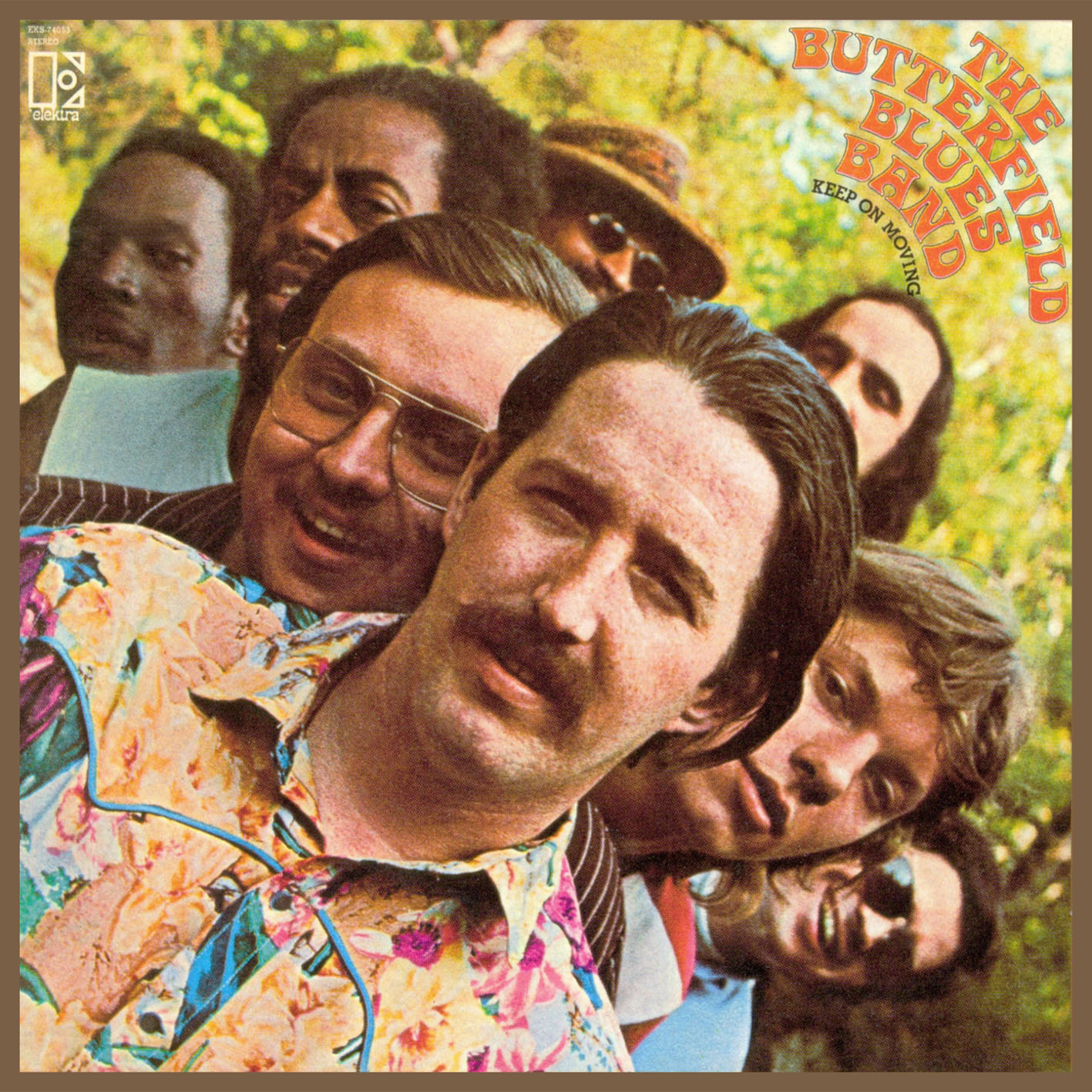
The Paul Butterfield Blues Band – Keep On Moving (1969/2015)
FLAC (tracks) 24 bit/192 kHz | Time – 42:08 minutes | 1,8 GB
Studio Master, Official Digital Download | Artwork: Front cover
Released in 1969, Keep on Moving was the fifth Elektra release by the Paul Butterfield Blues Band. During a four-year span the group’s namesake and leader was the only original member left from their first album in 1965. Morphing in a similar direction as Michael Bloomfield’s Electric Flag, this edition of the Butterfield Blues Band prominently fronted the horn section of David Sanborn on alto sax, Gene Dinwiddie on tenor, and Keith Johnson on trumpet. The band’s direction was full tilt, horn-dominated soul music, first explored on The Resurrection of Pigboy Crabshaw, which took them farther away from the highly regarded gritty blues experimentation of East-West and the duel guitar attack of Michael Bloomfield and Elvin Bishop. This album also signaled the final appearance of AACM and Art Ensemble of Chicago drummer Phillip Wilson, whose Butterfield swan song was the collaboration with Dinwiddie on the hippie gospel track “Love March,” of which an appropriately disjointed live version appeared on the Woodstock soundtrack album. The difference between Butterfield’s 1965 street survival ode “Born in Chicago” (“My father told me ‘son you’d better get a gun”) and “Love March” (“Sing a glad song, sing all the time”) left fans wondering if the band had become a bit too democratic. However, on cuts like “Losing Hand,” some of the band’s original fervor remains. Butterfield’s harp intertwining with the horn section sounds like a lost Junior Parker outtake and the Jimmy Rogers’ penned “Walking by Myself,” is the closest this band comes to the gutsy Windy City blues of its heyday. The remaining tracks aren’t horrible, but tend to run out of ideas quickly, unfortunately making what may have been decent material (with a little more effort) sound premature. Butterfield would make a few more personnel changes, release one final disc on Elektra, Sometimes I Just Feel Like Smilin’, and then dump the band altogether to embark on a solo career.
Tracklist:
01 – Love March
02 – No Amount Of Loving
03 – Morning Sunshine
04 – Losing Hand
05 – Walkin’ By Myself
06 – Except You
07 – Love Disease
08 – Where Did My Baby Go
09 – All In A Day
10 – So Far So Good
11 – Buddy’s Advice
12 – Keep On Moving
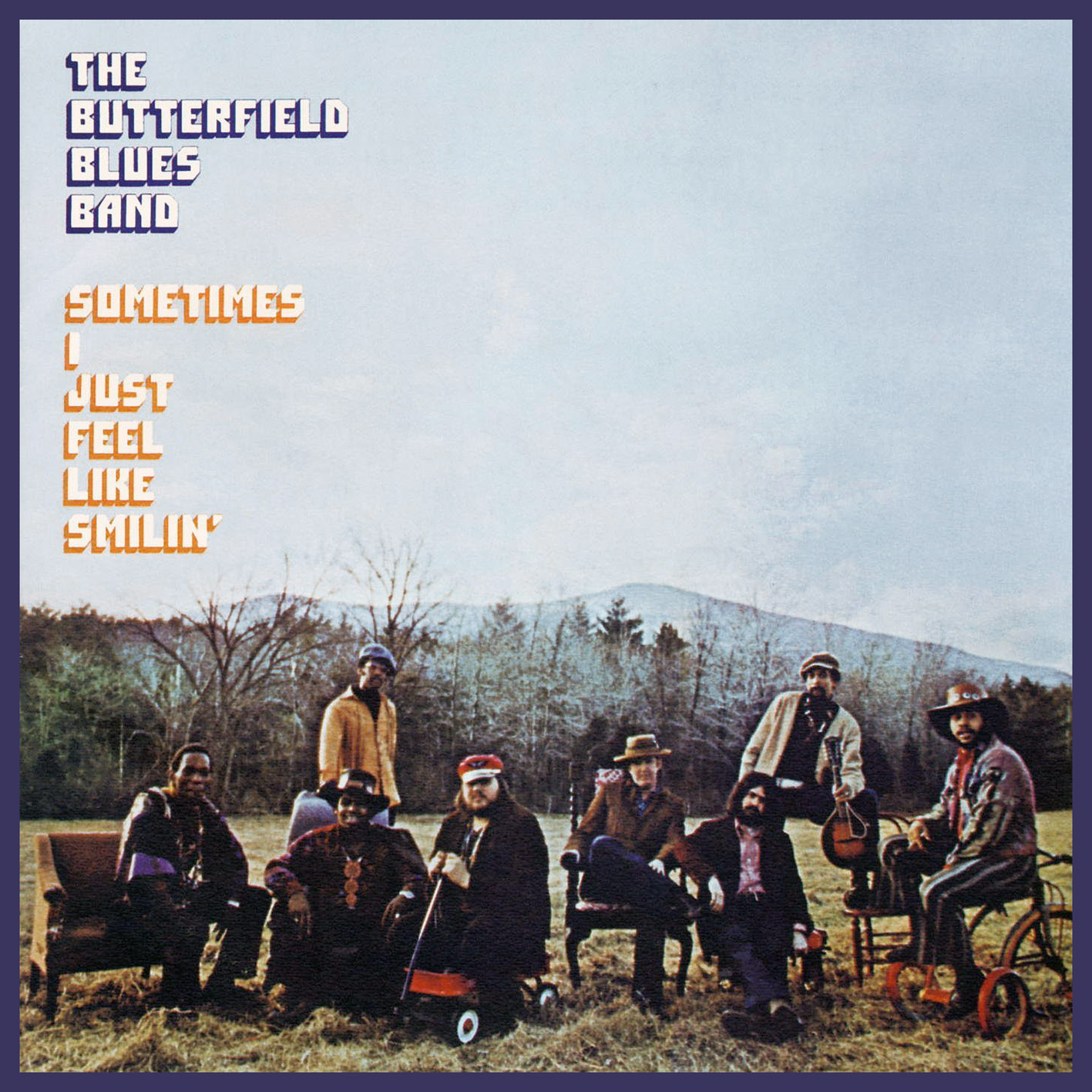
The Paul Butterfield Blues Band – Sometimes I Just Feel Like Smilin’ (1971/2015)
FLAC (tracks) 24 bit/192 kHz | Time – 39:01 minutes | 1,58 GB
Studio Master, Official Digital Download | Artwork: Front cover
The Butterfield Blues Band has been critically acclaimed as one the greatest electric blues bands ever! Their albums have stood the test of time as classics of the 60’s & early 70’s. Soul influenced Sometimes I Just Feel Like Smilin’ was originally released in 1971. The album features saxophonist David Sanborn. It was the last album the band recorded for Elektra Records.
Tracklist:
01 – Play On
02 – 1000 Ways
03 – Pretty Woman
04 – Little Piece Of Dying
05 – Song For Lee
06 – Trainman
07 – Nightchild
08 – Drowned In My Own Tears
09 – Blind Leading The Blind
Download:
ThePaulButterfieldBluesBand1965ThePaulButterfieldBluesBand.part1.rar
ThePaulButterfieldBluesBand1965ThePaulButterfieldBluesBand.part2.rar
ThePaulButterfieldBluesBand1966EastWest.part1.rar
ThePaulButterfieldBluesBand1966EastWest.part2.rar
ThePaulButterfieldBluesBand1967TheResurrectinfPigbyCrabshaw.part1.rar
ThePaulButterfieldBluesBand1967TheResurrectinfPigbyCrabshaw.part2.rar
ThePaulButterfieldBluesBand1968InMywnDream.part1.rar
ThePaulButterfieldBluesBand1968InMywnDream.part2.rar
ThePaulButterfieldBluesBand1969KeepnMving.part1.rar
ThePaulButterfieldBluesBand1969KeepnMving.part2.rar
ThePaulButterfieldBluesBand1971SmetimesIJustFeelLikeSmilin.part1.rar
ThePaulButterfieldBluesBand1971SmetimesIJustFeelLikeSmilin.part2.rar




















![Bob Dylan - The Cutting Edge 1965-1966: Bootleg Series Vol. 12 {Collector’s Edition} (2015) [FLAC 24bit/96kHz] Bob Dylan - The Cutting Edge 1965-1966: Bootleg Series Vol. 12 {Collector’s Edition} (2015) [FLAC 24bit/96kHz]](https://getimg.link/images/imgimgimg/uploads/2016/06/0FvvI2a.jpg)
![The Doors - The Complete Doors Studio Albums 1967-1972 (2012) [HDTracks FLAC 24bit/96kHz] The Doors - The Complete Doors Studio Albums 1967-1972 (2012) [HDTracks FLAC 24bit/96kHz]](https://getimg.link/images/imgimgimg/uploads/2017/10/8vjKd2O.jpg)
![Elvis Presley - The Complete ’70s Albums Collection (2015) [Qobuz FLAC 24bit/96kHz] Elvis Presley - The Complete ’70s Albums Collection (2015) [Qobuz FLAC 24bit/96kHz]](https://getimg.link/images/imgimgimg/uploads/2018/02/CSenCex.jpg)
![The Paul Butterfield Blues Band - The Paul Butterfield Blues Band (1965/2015) [HDTracks 24bit/192kHz] The Paul Butterfield Blues Band - The Paul Butterfield Blues Band (1965/2015) [HDTracks 24bit/192kHz]](https://getimg.link/images/imgimgimg/uploads/2015/08/snwMiKt.jpg)
![Grateful Dead - Complete Studio Albums Collection: 1967-1989 (2013) [HDTracks FLAC 24bit/192kHz] Grateful Dead - Complete Studio Albums Collection: 1967-1989 (2013) [HDTracks FLAC 24bit/192kHz]](https://getimg.link/images/imgimgimg/uploads/2017/03/fYL2581.jpg)
![The Doors - Infinite (2013) [6x SACD LE Box Set - Analogue Productions’ Remasters 2013] {SACD ISO + FLAC 24bit/88,2kHz} The Doors - Infinite (2013) [6x SACD LE Box Set - Analogue Productions’ Remasters 2013] {SACD ISO + FLAC 24bit/88,2kHz}](https://getimg.link/images/imgimgimg/uploads/2017/10/s8DmvBK.jpg)
![The Allman Brothers Band - The 1971 Fillmore East Recordings (2014) [ProStudioMasters FLAC 24bit/96kHz] The Allman Brothers Band - The 1971 Fillmore East Recordings (2014) [ProStudioMasters FLAC 24bit/96kHz]](https://getimg.link/images/imgimgimg/uploads/2016/04/0a35Te8.jpg)
![The Paul Butterfield Blues Band - The Paul Butterfield Blues Band (1965) [Audio Fidelity 2014] SACD ISO The Paul Butterfield Blues Band - The Paul Butterfield Blues Band (1965) [Audio Fidelity 2014] SACD ISO](https://getimg.link/images/imgimgimg/uploads/2017/12/WLGQPDY.jpg)
![Todd Rundgren - The 70’s Collection (2015) [HighResAudio FLAC 24bit/96kHz] Todd Rundgren - The 70’s Collection (2015) [HighResAudio FLAC 24bit/96kHz]](https://getimg.link/images/imgimgimg/uploads/2016/11/6vuDLyg.jpg)
![Nick Cave & The Bad Seeds - 14 Studio Albums (1984-2008) [FLAC 24bit/48kHz] Nick Cave & The Bad Seeds - 14 Studio Albums (1984-2008) [FLAC 24bit/48kHz]](https://getimg.link/images/imgimgimg/uploads/2017/11/upzutTd.jpg)
![Prince - Classic Albums Collection 1978-1986 (2013) [HDTracks FLAC 24bit/192kHz] Prince - Classic Albums Collection 1978-1986 (2013) [HDTracks FLAC 24bit/192kHz]](https://getimg.link/images/imgimgimg/uploads/2016/04/dNrNO58.jpg)
![The Cars - Studio Album Collection 1978-1987 (2014/2014) [HDTracks 24bit/192kHz] The Cars - Studio Album Collection 1978-1987 (2014/2014) [HDTracks 24bit/192kHz]](https://getimg.link/images/imgimgimg/uploads/2015/08/STW3b8V.jpg)
![John Lennon - Signature Box (2010/2014) [24bit/96kHz] John Lennon - Signature Box (2010/2014) [24bit/96kHz]](https://getimg.link/images/imgimgimg/uploads/2015/08/61Ns3xochRL._SL1500_.jpg)
![Creedence Clearwater Revival - The Complete Studio Albums (2014) [HDTracks FLAC 24bit/192kHz] Creedence Clearwater Revival - The Complete Studio Albums (2014) [HDTracks FLAC 24bit/192kHz]](https://getimg.link/images/imgimgimg/uploads/2016/07/hygQ6uc.jpg)
![Billy Joel - The Complete Albums Collection (2011/2014) [Qobuz FLAC 24bit/96kHz] Billy Joel - The Complete Albums Collection (2011/2014) [Qobuz FLAC 24bit/96kHz]](https://getimg.link/images/imgimgimg/uploads/2018/01/7pJd7RG.jpg)